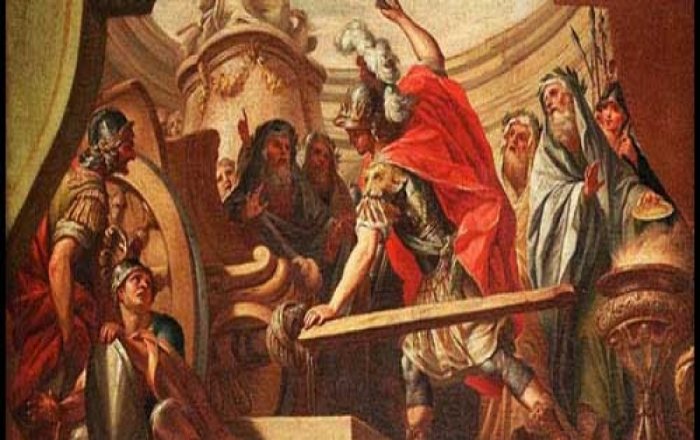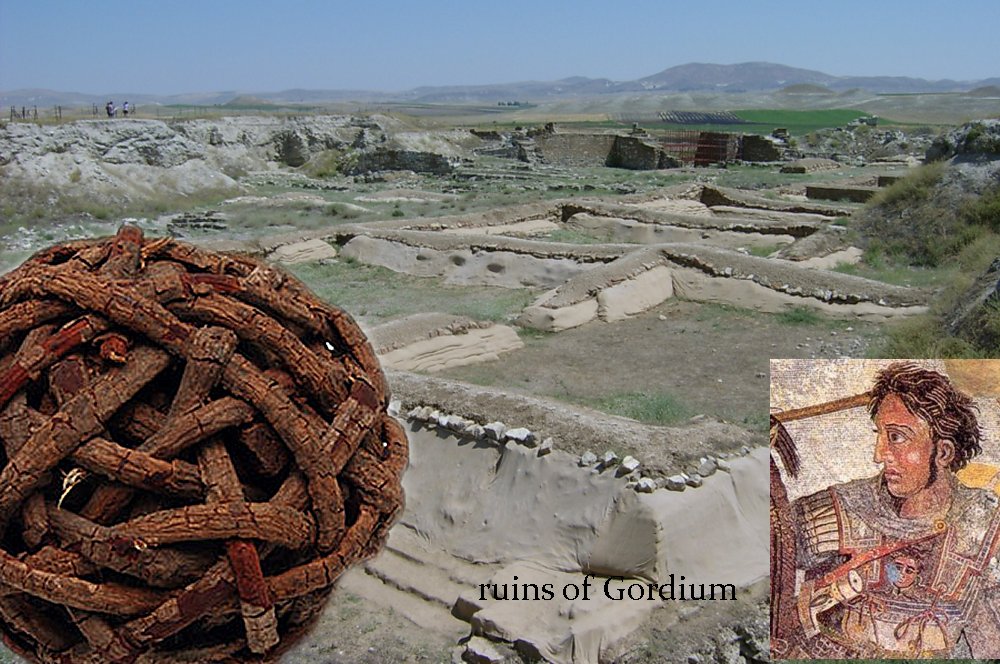Gordian Knot And How Alexander The Great Managed To Outmaneuver The Problem
A. Sutherland - AncientPages.com - The Gordian Knot is a metaphorical expression that means a complicated problem or deadlock when we have an unsolvable problem, which is our "impossible knot."
Alexander the Great slicing the Gordion knot with a sword-stroke. Credit: Public Domain
It began long ago when the Phrygians had no ruler and plunged into a civil war. An ancient prophecy of the oracle was announced at Telmissus (the ancient capital of Lycia).
It said that the new king would be the one who would enter the city in a simple ox-cart.
The first through the city's gates were Gordias, a poor peasant who came to the town with a cart drawn by an ox with his wife. He tied its yoke to a post with a highly sophisticated knot called the Gordian Knot. Gordias was declared king, and his grateful son, Midas, dedicated the ox-cart to the Phrygian god Sabazios (identified with Zeus).
Roman historian Quintus Curtius Rufus later described the knot as a masterwork. It comprised "several knots all so tightly entangled that it was impossible to see how they were fastened."
Gordias founded the city of Gordium, which became the Phrygian capital, and his ox-cart was preserved and remained in the royal palace. According to the oracle's prophecy, a man who untied the knot would receive power over Asia Minor or all of Asia.
In the 4th century BC, Alexander the Great reached Phrygia and Gordium, allegedly Midas's capital. After taking the city of Gordium, Alexander was shown the chariot of Gordias, founder of the old Phrygian monarchy, and was told about the prophecy.
Alexander wanted to untie the knot, but he had no idea how to do it, so he drew his sword and sliced it in half with a single stroke, or as another version says, he loosed the knot by pulling the linchpin from the yoke.
Aristobulus, an early historian, architect, and military engineer, as well as a close friend of Alexander) later claimed that untying the knot was easy for Alexander; he removed what they call the pole-pin, with which the yoke-knot was held together, and then drew back the yoke.
We will never know what really happened in the palace in Gordium and whether Alexander managed to untie the complex knot.
Norman F. Cantor, in his book "Alexander the Great Journey to the End of the Earth" writes:
"Shortly after one of Alexander's first victories, the Battle of Granicus, he learned that a few miles away, a certain King Gordias had left as a legacy a very difficult knot to untie. It was said (probably by Alexander's propagandists) that whoever untied the knot would conquer all of Asia. Sources disagree about what happened.
Some say that Alexander cleverly untied the knot, others that he simply unsheathed his sword and cut it. But one way or another, he untied or "cut the Gordian knot."
Fox relates the tale this way:" On the day before leaving Gordium, he went up to the acropolis meaning to try the chariot which he had saved for his farewell; friends gathered round to watch him, but hard though he pulled, the knot round the yoke remained stubbornly tight. When no end could be found, Alexander began to lose patience, for failure would not go down well with his men. Drawing his sword, he slashed the knot in half, producing the necessary end and correctly claiming that the knot was loosed, if not untied. The aged Aristobulus (one of Alexander's early historians)… later claimed that Alexander had pulled a pin out of the chariot link and drawn the yoke out sideways through the knot, but the sword cut has the weight of authority behind it and is preferable to an eighty-year-old historian's apology; either way, Alexander outmaneuvered, rather than unraveled, his problem.
He also managed to arouse an interest in what he had done."
"There were thunderclaps and flashes of lightning that very night," conveniently signifying that Zeus approved, so Alexander offered sacrifice to the "gods who had sent the signs and ratified his loosing of the knot..." (Robin Lane Fox, Alexander the Great)
Tough, resolute, fearless. Alexander was a born warrior and a ruler of passionate ambition who understood the intense adventure of conquest and of the unknown. When he died in 323 B.C.E. at age thirty-two, his vast empire comprised more than two million square miles, spanning from Greece to India. His achievements were unparalleled—he had excelled as a leader to his men, founded eighteen new cities, and stamped the face of Greek culture on the ancient East. The myth he created is as potent today as it was in the ancient world. Robin Lane Fox's superb account searches through the mass of conflicting evidence and legend to focus on Alexander as a man of his own time. Combining historical scholarship and acute psychological insight, it brings this colossal figure vividly to life.." Read more
Alexander later went on to conquer Asia as far as the Indus and the regions of the Oxus, a major river in Central Asia. The prophecy was fulfilled.
Written by – A. Sutherland AncientPages.com Staff Writer
First version of this article was published on July 20, 2020
Copyright © AncientPages.com All rights reserved. This material may not be published, broadcast, rewritten or redistributed in whole or part without the express written permission of AncientPages.com
More From Ancient Pages
-
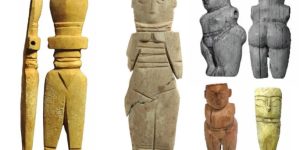 Ancient Wooden ‘Coptic Dolls’ May Have Been The Ancestors Of Today’s Barbie Dolls
Archaeology | Sep 23, 2023
Ancient Wooden ‘Coptic Dolls’ May Have Been The Ancestors Of Today’s Barbie Dolls
Archaeology | Sep 23, 2023 -
 On This Day In History: Great English Dramatist And Poet William Shakespeare, Was Probably Born – On Apr 23, 1564
News | Apr 23, 2016
On This Day In History: Great English Dramatist And Poet William Shakespeare, Was Probably Born – On Apr 23, 1564
News | Apr 23, 2016 -
 Amazing Adventures Of Örvar-Oddr And Encounter With The Mysterious Ögmundr Flóki
Myths & Legends | Feb 27, 2023
Amazing Adventures Of Örvar-Oddr And Encounter With The Mysterious Ögmundr Flóki
Myths & Legends | Feb 27, 2023 -
 Fluctuating Oxygen Levels May Have Accelerated Animal Evolution
Archaeology | Oct 19, 2022
Fluctuating Oxygen Levels May Have Accelerated Animal Evolution
Archaeology | Oct 19, 2022 -
 Lady Trieu: Fierce Warrior, Rebel, Freedom Fighter And National Hero In Vietnam
Featured Stories | Feb 26, 2019
Lady Trieu: Fierce Warrior, Rebel, Freedom Fighter And National Hero In Vietnam
Featured Stories | Feb 26, 2019 -
 25,000 Ancient Egyptian Statues, Ushabti Figurines And Artifacts From New Kingdom Cemetery Revealed For The First Time
Archaeology | Oct 26, 2023
25,000 Ancient Egyptian Statues, Ushabti Figurines And Artifacts From New Kingdom Cemetery Revealed For The First Time
Archaeology | Oct 26, 2023 -
 The Inca Empire Was Powerful And Well-Organized – Why Were They So Successful?
Ancient History Facts | Sep 21, 2020
The Inca Empire Was Powerful And Well-Organized – Why Were They So Successful?
Ancient History Facts | Sep 21, 2020 -
 Weapons Of Ancient Aztec Warriors Of Mesoamerica
Featured Stories | Mar 23, 2017
Weapons Of Ancient Aztec Warriors Of Mesoamerica
Featured Stories | Mar 23, 2017 -
 Early Humans In Europe Were Making Fires At Least 250,000 Years Ago – New Study
Archaeology | May 18, 2023
Early Humans In Europe Were Making Fires At Least 250,000 Years Ago – New Study
Archaeology | May 18, 2023 -
 Terrace Farming Was Invented In South American Andes Over 1,000 Years Ago
Ancient History Facts | Sep 7, 2016
Terrace Farming Was Invented In South American Andes Over 1,000 Years Ago
Ancient History Facts | Sep 7, 2016 -
 Slovenia’s Unique Discovery Of Masts, Sails And Small Harbor Found At The Bottom Of The Adriatic Sea
Archaeology | Apr 2, 2024
Slovenia’s Unique Discovery Of Masts, Sails And Small Harbor Found At The Bottom Of The Adriatic Sea
Archaeology | Apr 2, 2024 -
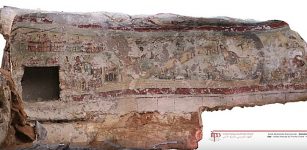 1,800-Year-Old Richly Painted Tomb Unearthed In Northern Jordan
Archaeology | Oct 1, 2018
1,800-Year-Old Richly Painted Tomb Unearthed In Northern Jordan
Archaeology | Oct 1, 2018 -
 A Ptolemaic Mummy Reveals Evidence Of Dental Filling Used In Ancient Egypt
Archaeology | Aug 6, 2020
A Ptolemaic Mummy Reveals Evidence Of Dental Filling Used In Ancient Egypt
Archaeology | Aug 6, 2020 -
 Enigma Of Ancient Upside Down Stairs At Sacsayhuamán
Ancient Mysteries | May 27, 2014
Enigma Of Ancient Upside Down Stairs At Sacsayhuamán
Ancient Mysteries | May 27, 2014 -
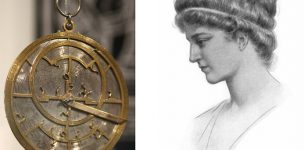 Hypatia Of Alexandria – Brilliant, Controversial Scientist And Her Dramatic End
Featured Stories | Jan 7, 2019
Hypatia Of Alexandria – Brilliant, Controversial Scientist And Her Dramatic End
Featured Stories | Jan 7, 2019 -
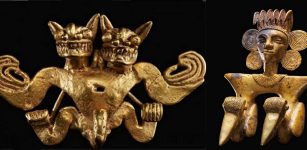 Mysterious Sophisticated Gran Coclé Culture Reveals Its Ancient Secrets
Civilizations | Mar 9, 2020
Mysterious Sophisticated Gran Coclé Culture Reveals Its Ancient Secrets
Civilizations | Mar 9, 2020 -
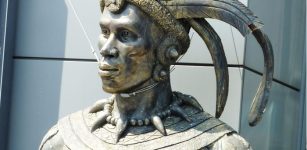 Shaka Zulu: African Hero And One Of Greatest Military Leaders Of All Time
Featured Stories | Nov 5, 2016
Shaka Zulu: African Hero And One Of Greatest Military Leaders Of All Time
Featured Stories | Nov 5, 2016 -
 Knowledge Of Secret Ancient Underground Civilization Revealed By Maya Priests
Ancient Mysteries | Nov 1, 2018
Knowledge Of Secret Ancient Underground Civilization Revealed By Maya Priests
Ancient Mysteries | Nov 1, 2018 -
 Virtual Nubia: Sudan’s Medieval Monasteries Digitally Reconstructed By Polish Archaeologists
News | Oct 8, 2020
Virtual Nubia: Sudan’s Medieval Monasteries Digitally Reconstructed By Polish Archaeologists
News | Oct 8, 2020 -
 Curious Encounter Between Inuit And Vikings Led To Something Surprising That Shaped History
Featured Stories | Aug 4, 2024
Curious Encounter Between Inuit And Vikings Led To Something Surprising That Shaped History
Featured Stories | Aug 4, 2024

